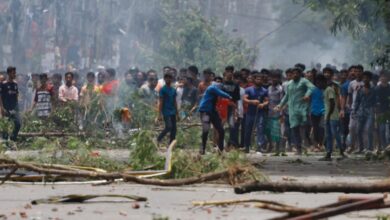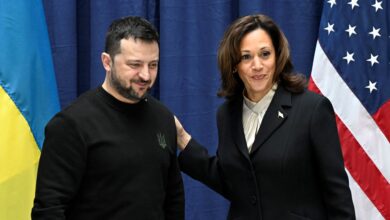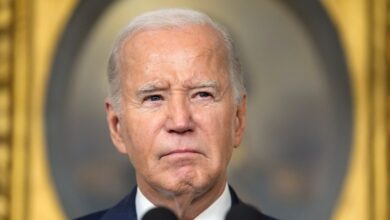
A week into Israel’s war on Gaza, 800 eminent scholars and practitioners of law sounded the alarm about an imminent genocide in the territory. What made this warning both powerful and chilling was that so many legal experts came to this sombre conclusion together. It is not a claim that can be made easily.
Since that letter was released, the situation in Gaza has only gotten worse. The death toll has passed 11,000, while some 2,650 individuals, including approximately 1,400 children, are reported missing, potentially trapped or deceased beneath the rubble. Tens of thousands of wounded are overwhelming struggling medical facilities. The humanitarian situation has reached horrific levels, compounded by the lack of food, water, fuel and electricity.
To understand what is transpiring in Gaza, we must turn to the key legal frameworks that define genocide: Article 6 of the Rome Statute for the International Criminal Court and Article 2 of the Genocide Convention.
According to these documents, genocide involves acts committed with the specific intent to destroy, either in whole or in part, a national, ethnic, racial, or religious group. These acts encompass killing members of the group, causing them serious harm, and imposing conditions of life aimed at physical destruction of the group in whole or in part, among other underlying acts. Notably, the people targeted can be a geographically limited part of the group.
Gaza’s devastating reality mirrors these components of genocide. Despite claiming to target only Hamas, Israel is engaged in an all-out assault on the whole population of Gaza. In just the first week of its relentless assault, it dropped more than 6,000 bombs on the Strip – nearly as many as the United States used in Afghanistan in a full year.
Using high-impact munitions in one of the most densely populated places in the world inevitably leads to a high death toll among civilians, as we have witnessed already in Gaza. In a month, the Israeli bombardment has killed more than 4,400 children and 2,900 women, with many of the men in these horrific statistics also non-combatants.
The Israeli army has also dropped any pretence to “precision strikes”, as its spokesperson Daniel Hagari said its emphasis is “on damage and not accuracy”.
It has also mass-targeted civilian buildings, including hospitals and schools sheltering the displaced. It has bombed residential buildings, wiping out whole families from the population registrar; more than 45 percent of homes were destroyed or damaged, many of them in the supposed “safe areas” of the south where the Israeli army had instructed Palestinians to evacuate to.
This mass killing of civilians is accompanied by the imposition of life conditions aimed clearly at the physical destruction of the Palestinian people. Israel has put Gaza under complete siege, with “no electricity, no food, no water, no gas”, as declared by Israeli Defence Minister Yoav Gallant.
Israel’s bombing of hospitals, the targeting of their solar panels and the blocking of fuel deliveries indicate an intent to prevent Palestinians from accessing life-saving healthcare. More than one-third of hospitals and two-thirds of primary healthcare in Gaza have already shut down.
The Israeli refusal to allow adequate amounts of much-needed humanitarian aid – including food and water – indicates it is willing to allow the Palestinian population to succumb to starvation and disease.
Israeli government and military officials have also verbalised their genocidal intent towards the Palestinian people. On October 9, when announcing the full blockade, Gallant described the 2.3 million people in Gaza as “human animals”. On October 29, Israeli Prime Minister Benjamin Netanyahu used Judaic scripture to justify the killing of Palestinians. “You must remember what Amalek did to you, says our Holy Bible,” he said, quoting a verse that goes on to say: “Now go and smite Amalek … kill both man and woman, infant.”
On November 5, Heritage Minister Amihai Eliyahu said one of Israel’s options in Gaza is to drop a nuclear bomb. He also explained that no humanitarian aid should be provided to Palestinian civilians as “there is no such thing as uninvolved civilians in Gaza”. While his statement faced criticism from Israeli officials, the concerns raised were primarily centred around the potential impact on “Israel’s image” rather than acknowledging the grave implications of such remarks as a potential tool of genocide.
There has been a litany of other official statements employing dehumanising language towards Palestinians, along with incitement by common Israelis for the “annihilation of Gaza”. These reveal the intent to commit war crimes, crimes against humanity, and, indeed, genocide.
In the words of genocide expert and survivor of the Bosnian genocide, Arnessa Buljusmic-Kastura, “That sort of rhetoric is not uncommon when it comes to cases of genocide. It is obviously one of the most important stages when you really consider it, and to hear the openly dehumanising language spoken with so much fervour in the media from government leaders, and from regular people too, is horrifying and it all leads us to where we are at right now, which is the fact that what is happening in Gaza is a genocide.”
While what is happening in Gaza shares common features with other previous situations of genocide, there are also particular elements unique to it. Among these distinct features are the enduring occupation of Palestinian lands, the relentless siege on Gaza, and the staggering proportion of the Palestinian nation already displaced by previous acts of ethnic cleansing.
Additionally, at the heart of this tragedy lies a discourse of dehumanisation, serving both as a strategy and an outcome. The longstanding anti-Palestinian discourse, ongoing since the inception of Zionism, has systematically denied the existence and the rights of Palestinians. The narrative of Israel as “a land without a people, for a people without a land” has effectively erased an entire indigenous population, along with its history, heritage, and grievances.
In parallel, Palestinians have been systematically demonised through narratives that portray them as terrorists, anti-Semites, and even Nazis. Evoking absurd claims of the “Nazification of Palestinians”, Israel, a powerful settler colonial state that has presided over the longest occupation in modern history, is trying to depict itself as a victim; its tormentor – the people it has systematically oppressed and dispossessed for decades.
It is imperative to grasp these distinct aspects of the unfolding genocide in Gaza, as we confront and respond to it. We must not forget that what is happening now is part of a long history of Israeli actions against the Palestinians, extending beyond the Gaza Strip, with genocidal intent and practices targeting other Palestinian communities
We must not forget it as Israel and its allies try to decontextualise what is going on in Gaza and portray it as a war “provoked” by Hamas’s October 7 attack.
Talk about self-defence for Israel is dominating Western rhetoric, with minimal consideration for human lives and adherence to the rules of armed conflict, let alone the 56-year military occupation and 16-year siege of Gaza. This constitutes a fundamental flaw in the appraisal of these events, and, consequently, the ability to address their root causes, as subtly alluded to by UN Secretary-General Antonio Guterres in his October 24 address to the Security Council.
The lessons of the Holocaust were meant to serve as safeguards against state violence and genocide, particularly for vulnerable groups. What we are witnessing today, however, is an unprecedented global dehumanisation campaign against the Palestinians, pushing their narratives, experiences, and histories to the margins.
Historically, the initiation of such campaigns has often been a precursor to genocide. Therefore, it is imperative to restore the Palestinian people’s humanity and recognise their shared history and rights, as a people, as we push for an immediate cessation of the unfolding genocide.
We are witnessing a rapidly growing anti-Palestinian sentiment not only in Israel but also in many European countries, clearly visible in how the authorities are dealing with demonstrations and support for the Palestinian people. It is incumbent upon the international community to address this hatred with the same vigour as it has addressed anti-Semitism.
While the 1949 Geneva Conventions require all state parties “to respect and ensure respect” of these conventions in all circumstances, the Genocide Convention places a legal obligation on every member state to prevent and punish even the attempt to commit this heinous crime, without waiting for it to fully manifest.
“Never again” was meant to be a warning for future generations, yet we have seen genocides occur since the Holocaust, met with global silence. It is time to make “never again” a living principle, an urgent call to action.
In Gaza, “never again” is now.
The views expressed in this article are the authors’ own and do not necessarily reflect Al Jazeera’s editorial stance.
Source link




